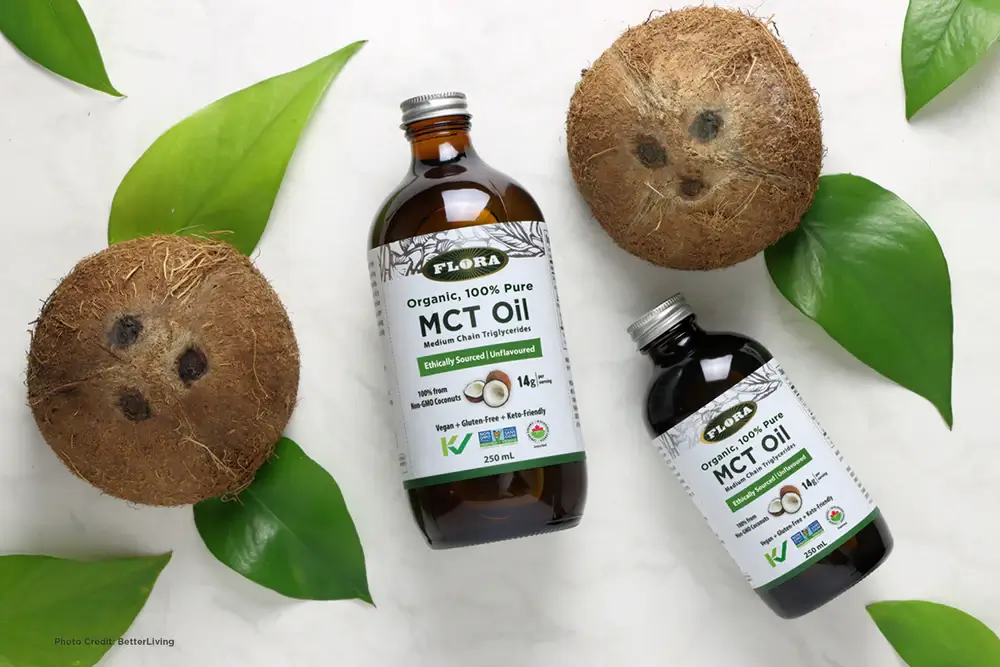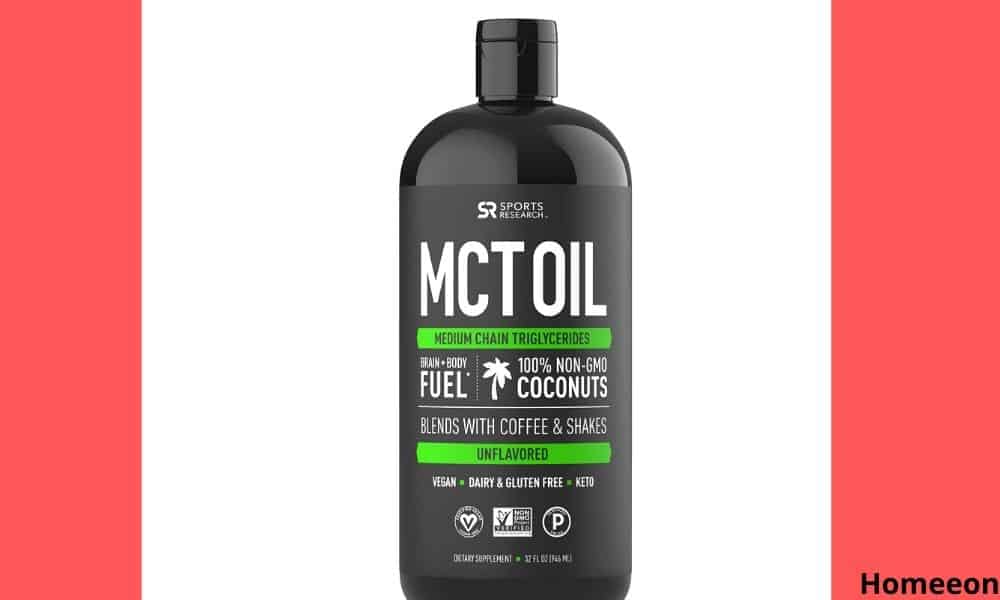Last Updated on August 10, 2023 By Emma W. Thomas
MCT oil lasts for several months to a few years, depending on storage conditions. Its benefits include improved energy, weight management, and cognitive function. Store it in a cool, dark place, away from sunlight and heat sources, to maintain its quality.
How Long Does MCT Oil Last?
MCT oil, short for Medium-Chain Triglyceride oil, has become a popular supplement due to its potential health benefits. It can aid in weight loss, increase focus, and provide quick energy. However, a common question with MCT oil, as with any supplement or food product, is its shelf life. This listicle will explore the lifespan of MCT oil and how to properly store it for maximum longevity and effectiveness.
1. Shelf Life of Unopened MCT Oil
In its unopened state, MCT oil generally lasts about 2 years from the manufacturing date. The exact time may vary depending on brands and manufacturing processes.
2. Shelf Life of Opened MCT Oil
Once opened, MCT oil typically lasts for about 6-12 months. It’s recommended to check the bottle’s label as the manufacturer’s instructions would provide specific guidance.
3. Indications of Spoilage
Indications that your MCT oil has gone bad may include changes in color, consistency, or smell. If the oil develops a rancid smell, changes color, or becomes lumpy, it’s likely no longer good to consume.
4. Storage Conditions Impact Shelf Life
Storing your MCT oil under the right conditions can help increase its shelf life. It should be kept in a cool, dry place away from direct sunlight. The cap should always be tightly closed.
5. Refrigeration is not Needed
Unlike some other oils, MCT oil does not need to be refrigerated. In fact, refrigeration may cause the oil to solidify, making it harder to consume.
6. Make Note of the Expiry Date
Every bottle of MCT oil should ideally carry an expiry date. It’s essential to take note of this date and use the oil before it expires.
7. Lack of Preservatives Affect Lifespan
Since many brands of MCT oil do not include preservatives, the oil tends to have a short lifespan once opened. Always ensure the cap is tightly sealed after use to avoid exposure to air, which can accelerate spoilage.
Summary Table
| Shelf Life | |
|---|---|
| Unopened MCT Oil | Approximately 2 years |
| Opened MCT Oil | Between 6-12 months |
| Spoilage Signs | Odd smell, color change, lumpiness |
| Storage | Cool, dry place |
| Refrigeration | Not required |
In conclusion, MCT oil can last a considerable amount of time if stored properly and used within the recommended time frame. So buy with confidence, knowing that you’ll likely finish the bottle long before it ever goes bad.
How Can You Tell If Your MCT Oil Has Gone Bad?

While MCT oil does not go bad easily, its exposure to moisture and air as well as poor storage can make it get spoiled. Your intuition can guide you on whether to continue using this product or discard it. For example, if you have had it in your house for a long time or know that you have not stored it properly, you can get rid of it. The following tips can also help you to know whether your product has gone bad or not;
Taste And Smell
MCT oil produces a rancid smell, and Its taste will also not be pleasant when it goes bad. If you notice this smell or taste in your oil, it should indicate that it’s time to discard the product. Never use any product that you suspect to have expired since it may be health hazardous.
Consistency
Like olive oil, MCT oil has a light and thin consistency. If you see that your oil has a thicker consistency, it is an indication that it has gone bad and thus a need to discard it.
Color
MCT oil may lose its color vibrancy with time as its quality decreases. While a discolored oil may still be safe to drink, it is necessary to look for other indication that shows whether the oil has gone bad or not. In case there are other factors to show that the quality is compromised, discarding it will be the best option for you.
Clarity
MCT oil that is still fresh and safe is very clear. However, you may realize that this clarity may change with time and as you continue storing your product. If you notice that your oil is not as clear as it should be, then it’s high time that you do away with it.
How To Store Your MCT Oil
Improper storage is one of the main factors that cause your MCT oil to go bad before its time. You can prolong your MCT oil’s life by doing the following;
Store In A Dry, Cool Place Away From Direct Sunlight
MCT oil undergoes the oxidation process when exposed to heat, light, and moisture. You need to store your oil away from such triggers to keep it fresh for long. You can choose a dark place in your pantry that is dry, as this will enhance the longevity and freshness of your product.
Storing The MCT Oil In Your Refrigerator
Refrigerating your MCT oil is also an excellent way of keeping it away from direct sunlight and heat. It is also an excedllent way to keep it chilled for those who love adding it to their cold coffee or making mayo. It is, however, important to ensure that the bottle is airtight and tightly capped before putting the MCT oil in the refrigerator.
What Are The Health Benefits Of Using MCT Oil?

MCT (medium-chain triglyceride) oil contains fats (triglycerides) that are medium-length chains and easily digestible than longer-chain fatty acids. There are four different types of MCTs, with capric and caprylic acids being the most commonly used for MCT oil; specific types of these oils have some benefits that include;
Potential To Promote Weight Loss
MCT oil can potentially promote weight loss, although current research is mixed about the issue. This oil increases the release of leptin and peptide YY hormones that promote the feeling of fullness. Some studies have shown that people who take two tablespoons of MCT oil with their breakfast eat less food for their lunch.
Some studies have also shown that consumption of MCT oil could help reduce waist circumference and body weight. The oil is also believed to help prevent obesity.
A Great Source Of Energy
The body absorbs MCTs more readily than LCTs (long-chain triglycerides) which have many carbons in their fatty acid chains. MCTs move faster from the gut to the liver, and they don’t need bile for their breakdown, unlike longer-chain fats. Fats are broken down in the liver for use as fuels or stored as body fat. MCT oils enter the cells without breaking down, and they can act as an immediate source of energy.
MCTs can be converted into ketones in the liver for those who are on a ketogenic diet. These ketones will then pass through the barrier in the brain blood and make them a source of energy for the brain cells.
Helps In The Reduction Of Lactate Buildup In Athletes
High lactate levels can affect performance during exercise, and MCTs will help minimize the lactate buildup. According to some studies, athletes who consume about one and a half teaspoons of MCTs with food before cycling had reduced lactate levels. They could easily exercise as compared to athletes who took LCTs. If taken before one engages in exercise, MCT oil can help you use more fat instead of carbs to get energy.
While MCTs can help enhance fat burning, it is unclear whether MCT oil helps one exercise better.
Great In Management Of Autism, Epilepsy, And Alzheimer’s Disease
According to some studies, a combination of the ketogenic diet and MCT oil can help manage conditions such as autism, Alzheimer’s disease, and epilepsy. Fasting enhances the production of ketones that help to reduce epileptic seizure frequency.
MCTs can be converted into ketones that are useful in managing epilepsy. Some MCT, like capric acid, improves the control of seizures better than drugs.
Alzheimer’s disease can impair the ability of the brain to use sugar. MCT oil provides ketones which are an alternative source of energy that helps the brain cells to survive better. An MCT ketogenic diet also helps to block a brain receptor that is responsible for memory loss. Studies have shown that consuming twenty to seventy grams of supplemental MCTs that include capric or caprylic can improve mild to moderate Alzheimer’s symptoms.
MCT oil is seen to work well in children with autism. A study has shown that the addition of MCTs to a gluten-free and ketogenic diet helps improve autism behavior in most children.
Reduction Of Risk Factors For Heart Disease
Some factors, such as smoking, inflammation, blood pressure, high cholesterol, and body mass index, increase the risk for heart disease. MCT oil helps to support fat and weight loss, which reduces the risk of heart disease. MCT oil also helps to increase the production of heart-protective cholesterol.
Management Of Blood Sugar Levels
MCT oil is beneficial for people with diabetes, and it helps reduce the storage of fat and increase the burning of fat. People who consume MCT oil daily have reduced waist circumference, body weight, and insulin resistance.
Conclusion
How long your MCT oil lasts depends on several factors, such as exposure to moisture and light and also how you store it. If the oil is exposed to these conditions, it could undergo an oxidation process and produce an unpleasant smell and taste. Storing the MCT oil for so long will also make the oil produce a rancid smell and a bad taste.
FAQS
Are there any side effects of using MCT oil?
While the use of MCT oil has several health benefits, there are a few concerns of using this oil that include;
- Gastrointestinal discomfort and diarrhea
MCT oil is known to cause diarrhea and other gastrointestinal discomfort, especially to new users. It is advisable to start slowly and observe the reaction of your stomach. For example, you can begin by adding a teaspoon to your coffee in the morning and drink it slowly over one hour and check if your stomach gets uncomfortable.
You can then increase the amount gradually until your body gets used to it. After a few days, you can start using a full tablespoon serving.
- Increased hunger
For individuals with eating disorders, MCT oil can lead to increased hunger. According to some studies, MCTs trigger the release of ghrelin and neuropeptide Y hormones known to arouse appetite in those suffering from anorexia.
Is MCT oil bad for the liver?
People who have uncontrolled diabetes need to avoid taking MCT oil since it increases the formation of ketones. Patients with such conditions as liver cirrhosis should also not take MCTs as they get primarily metabolized in the liver.
References:
https://www.doesitgobad.com/does-mct-oil-go-bad/
https://www.luckybelly.com/does-mct-oil-go-bad/
Emma is a graduate of Domestic Science or Family and Consumer Sciences (Home Economics) from the University of Wisconsin. She has 7 years of experience Working with the strategic section of BestBuy and now writing full-time for Homeeon.
From Managing the Home, Interiors, Cleaning, and Exteriors to Gardening and everything about Making A Home Liveable – is her passion and this Homeeon is the result of this.
Emma loves decorating her home with the best stuff found online. She cares about quality over anything and writes reviews about them here in Homeeon. Get in touch with her over Pinterest.
Keep reading her blogs.

